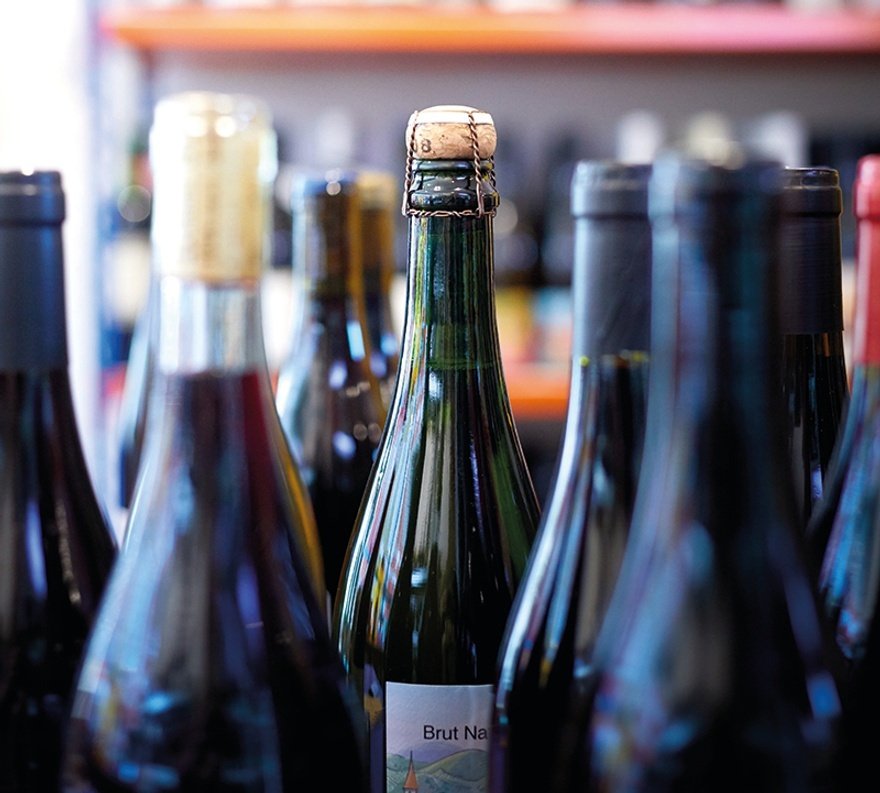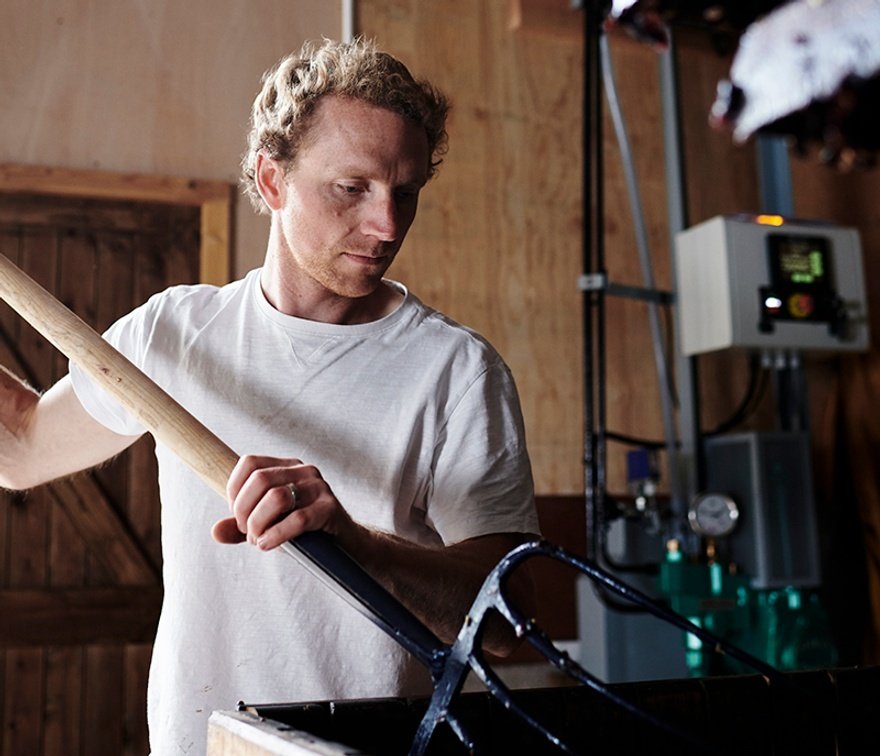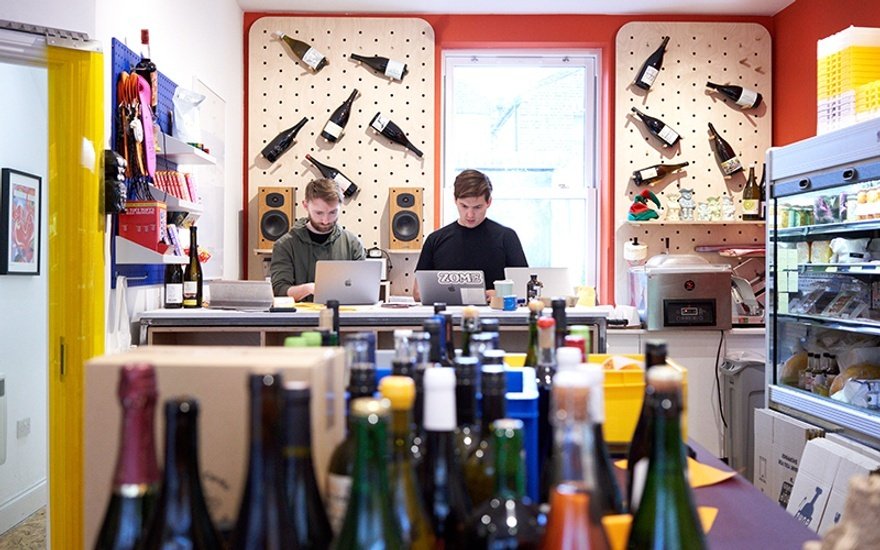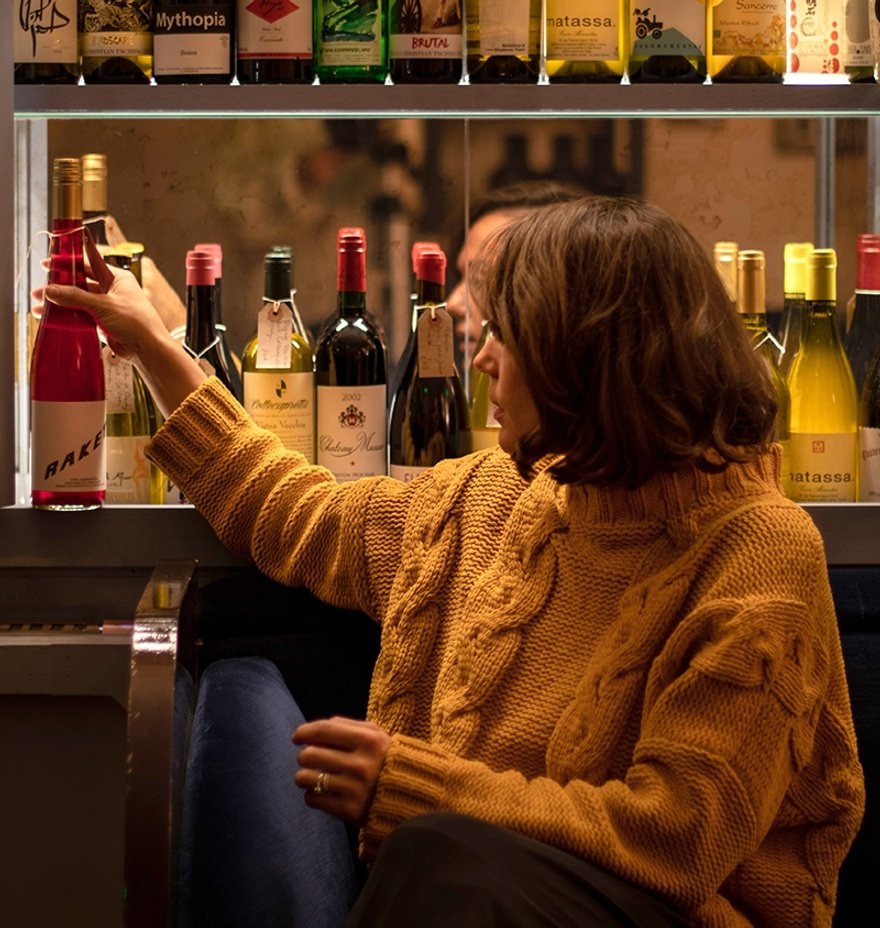Orange wine, pét nat and piquette may not be familiar terms to your average drinker, but they soon will be. Natural wines are becoming a regular feature on lists, breaking out from their hipster enclave to challenge traditional choices. Millie Milliken demystifies their world
When wine director and sommelier Honey Spencer was working at London wine institution Sager + Wilde in 2013, the term ‘natural wine' was discouraged.
"There was a time where even the word ‘natural' was controversial," she explains. "We weren't really allowed to use it in service as a lot of our guests were classically minded."
Eight years later and Spencer now runs the wine lists for the likes of restaurants Evelyn's Table, the Mulwray and the Palomar, where natural wines are either weaved into or dominate what are considered some of the capital's most exciting wine lists.
Natural wine is a movement that has only gained momentum in the UK in recent years. While Copenhagen, Germany, Spain and Japan were all early adopters of the category, the UK has taken significantly longer to embrace it. Perhaps part of the reason is that natural wine lacks a legal definition. In 2020, Jancis Robertson pointed out that an official definition had been formulated by the Institut National des Appellations d'Origine (INAO), which regulates French wine appellations, but ask any sommelier or winemaker and they'll have their own opinion. Generally speaking though, natural wines are made organically or biodynamically, using spontaneous fermentation, with no pesticides or chemicals, and with as little intervention as possible.
Perhaps another reason is that, for sommeliers, learning about natural wines means accepting that they have to start from scratch. Spencer says: "When people learn about wine, there are formulas. Suddenly, with natural wine, you have to accept you're starting again."
But as food and drink environmental practices are brought into focus, consumer tastes lean towards lower-ABV drinks and provenance-forward products change, natural wine is poised to become the high achiever on lists.
Local heroes
Natural wines are nothing new – they've been made for hundreds of years, predominantly in Europe – but English winemakers are slowly starting to produce them. One such winemaker is Ben Walgate, founder of East Sussex's Tillingham winery and previously of the Gusbourne Estate near Ashford in Kent. Walgate has seen first-hand the enthusiasm for natural wines since his first release under Tillingham in 2018: "It was a pink pét-nat [see glossary] and it certainly made an impact," says Walgate. "It put us on the map. We started going into export in Denmark and Norway, which are good for low-intervention and natural wine."
And while he started off selling to the likes of natural wine-focused bars Top Cuvée, Laughing Heart and Brawn, Walgate now counts 67 Pall Mall, the Connaught and other Michelin-starred and fine dining destinations as holders of his wines.
Another natural wine producer is Offbeat Wines, founded by Daniel Ham. With his winemaking credentials including Ridgeview wine estate in East Sussex, Ham spent the past few years at Langham wine estate in Dorchester, honing his natural winemaking skills before setting up shop himself in 2018.
"I come from a biological background and the kind of chemistry and wizardry [with ‘traditional' wines] never really sat that well with me. We've always drank a lot of natural wine, and over time I've realised this is the way I wanted to make wine." Now, Offbeat does contract winemaking for seven vineyards, primarily biodynamic and organic varieties, while also making its own, taking fruit from four or five vineyards. What's in store?
Someone else changing the natural wine landscape is Brodie Meah and his business partner Max Venning of London bars Top Cuvée in Highbury, Cave Cuvée in Bethal Green and its retail arm, Shop Cuvée, also in Bethnal Green, the latter two of which opened only this year.
"Fundamentally, we are an ecommerce business, which wasn't where we started," explains Meah, who began his career in wine working in fine dining in London before moving to Australia and finding a love for natural wine.
Top Cuvée brings natural wine to a nationwide audience through a retail-hospitality hybrid model. "We're from a hospitality background, so it's retail, but not in the traditional sense. We have the restaurant, which we view as the flagship, and we are essentially buying large volumes of wine at good price, but we also have this high-margin sales channel, so it works really well. Some bottles that don't sell online we can put on by the glass."
Top Cuvée and Shop Cuvée's locations mean that they, of course, serve the stereotypical natural wine demographic – young, professional, east London hipsters – but Meah also knows – through ecommerce data – that they're serving customers up to the 55-year-old mark and all across the country.
Knowing and understanding your demographic is particularly key when it comes to natural wines. Something that Sunny Hodge knows all too well. When the owner of Elephant & Castle's Diogenes the Dog opened low-intervention wine bar Aspen & Meursault in Battersea this year, his ‘breaking into tables' approach, where there is an open dialogue between the staff and the customer about the wine choices, proved trickier than expected.
"It was a big shock for me and the team here – but in a positive way. Here [Aspen & Meursault] fits your wine bar demographic, but we were put in a box and the team felt it was a bit of a grind. We're about breaking into tables, whereas for old schoolers it is very much ‘let me look at the menu'. We want to become more transactional."
For Hodge, this style of service means a huge investment in staff training – something he simply won't compromise on. "It's a lot to invest, but we won't let someone take an order without passing their test. Once they know their stuff… it's about building up that experiential journey. It's full-on and intense."
It's something Spencer points out as a key factor for making your natural wine selection sing, and she's also evolved her own house style of presenting these wines on a physical list.
"I've always had a lot of success with categorisation of wine lists according to how natural the wines are. So we go from the first category, with more familiar flavours and regions that wouldn't aggravate a classic wine drinker, all the way to the ‘Wild' category." On the list at the Mulwray, styles are categorised as ‘Firm Favourites', ‘The Path Less Trodden' and ‘Wild + Free'. A clever Sundowners flight takes guests through three wines spanning the colours of a sunset, from a skin contact white wine through to a rosé and a red. Whole new world
The opportunity for natural wine flights and food pairings is becoming increasingly exciting. Walgate says: "If you're drinking a conventionally made Chardonnay, the middle of the road stuff is interchangeable, but if you're doing a tasting menu and you want to show something unique and create a memorable experience, then natural wines work really well."
Spencer cites the ever-growing use by chefs of Japanese flavours as another reason why natural wines – that have a greater range of texture and acidity – are a more suitable approach than their more ‘traditional' counterparts.
Ham agrees: with Offbeat wines served in the likes of Ottolenghi's Nopi, the match for natural wines is a, well, natural one. "With a lot of newer restaurants, the food they're putting out – slightly spicy, fermented – match the flavours of natural wine so well. You also have people who have an appreciation for that style of food and they tend to lean towards natural things. It's a mentality where you are already open to new flavours."
Walgate also attributes a lot of Tillingham's natural wines success to the upsurge in people interested in field-to-fork eating. The connection between natural wine and the ever-present environmental crisis is something Hodge sees as instrumental in natural wine's longevity.
"Natural wine is just highlighting how screwed up our food and drink industry is. If we stop calling it funky and new, we can start thinking about why we don't care about not having chemicals in our soils, and asking what are the repercussions. Once we make that connection with natural wine, we'll take it more seriously."
Natural selection
While there are a plethora of positives about embarking or progressing the presence of natural wines in hospitality settings, there are some wider, more overarching challenges that still need overcoming. For Hodge, there needs to be a big PR job done for it to grow. "Natural wines misconceptions are the biggest thing to be tackled. Natural wine needs a massive PR job because its perceptions are its downfall, even if it is the fastest part of the wine industry."
Meah agrees, while also expressing a desire to make natural wine, well, normal. "I just think it will become ‘wine', which will be nice," he laughs, likening the term ‘natural wine' to ‘craft beer' where the latter is now considered to just be ‘beer' rather than specifically a craft product.
More microscopically, Spencer cites stability as a potential challenge. "A lot of the wines we buy, purely natural wines, they can be a little bit problematic when they arrive in the country. The wine just hasn't been ready, so sometimes we've had to hold it back for a couple of months. Shopping for natural wines needs increased vigilance."
Ham agrees: "Unfortunately, the situation is there are good and bad conventional wines and there are good and bad natural wines; some producers have jumped on the bandwagon and are selling faulty wine."
Also, while compared to five or so years ago, the quality and sheer volume of natural wine have both improved, there are fewer of those iconic natural wines as demand rises and allocations are stretched. "The London market has never been the largest market globally. The Tokyo market, New York, Paris, Copenhagen have always been prioritised, so a lot of the allocations in the UK are dwindling… what used to be a couple of cases is now three bottles."
Ham also sees a delay in terms of producers in the UK adopting natural wine methods, meaning that while growers are moving in the natural direction, there aren't enough people to actually make the wines. "I think farming is almost moving quicker than the wineries and there is a lag. Consumers and demand for these wines are huge… so I hope we will see more – hopefully there will be ‘the Tillingham effect'."
But while we wait, Spencer and Meah are positive about the natural wine community and the support it can give to restaurants and sommeliers embarking on the category. "There is so much help if you're a first-time natural wine buyer, with training, samples and help with pricing," says Spencer.
Top Cuvée will be embarking on training sessions in the new year and Meah makes sure to mention they will be open to trade. "The [natural wine] community that exists is definitely friendly and fun: come and say hello, you'll have people who want to help you out."
Definition mission: what is natural wine?
"I think it's nuanced and, for me, what I've realised is that the fifth element of terroir is the human influence. Natural wine is the philosophy and the attitude of the person guiding and making the wine… It is a pursuit of authenticity and honesty."
Daniel Ham, Offbeat Wines
"I can sum it up in one sentence: organic or biodynamic farming, nothing added, nothing taken away."
Honey Spencer, sommelier
"There's no legal definition for natural wine or a governing body, which means it could mean anything and it is good to tell guests that straight away. But splitting the winemaking process into farming and winemaking, farming is producing dynamic or biodynamic fruit and winemaking is making that fruit into wine where nothing is added and nothing is taken away."
Sunny Hodge, Diogenes the Dog and Aspen & Meursault
Glossary
Pét-nat Short for pétillant naturel, pét-nats are one of the oldest styles of wine. Low-sugar, naturally fermented sparkling wines are made with no added sugar or chemicals and fermented in the bottle.
Orange Orange wines are white wines that have been in contact with the grapes skins during fermentation, producing their colour (otherwise known as skin contact wines).
Amphora One of the oldest techniques in winemaking and originating in Georgia, this is where wine is aged in clay pots, allowing for the porous clay to oxidise the wine without imparting flavour.
Piquette These wines come in at a lower ABV due to the addition of water to grape pomace (the remain of the grapes after pressing) before fermenting it into a sparkling wine. Using the remains from the winemaking process makes this style of wine particularly virtuous.
Continue reading
You need to be a premium member to view this. Subscribe from just 99p per week.
Already subscribed? Log In








